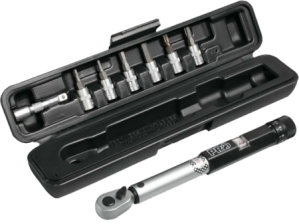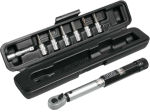 Getting torqued off?
Getting torqued off?That sound...if you've heard it before; you already know what I'm talking about. The subtle crackle of a carbon handlebar or seatpost bowing to the pressure of an over-torqued bolt. Or perhaps you heard the sharp snap of an aluminum stem clamp or steel seat clamp bolt - either way they're all unpleasant but preventable.
One could argue that the Torque Wrench has become the most valuable tool in a bike mechanic’s toolbox. Can you assemble or fix a bike without one? Absolutely. But, what other tool helps you complete that work with the confidence that you’ve got every bolt tightened to manufacturer’s specification, without being so tight you’re damaging the parts? That’s where the value lies: A torque wrench is cheaper than replacing a $200 seat post or $350 carbon handlebar!
You see, today’s ever-lighter aluminum and carbon components are still strong, but less tolerant to improperly applied torque. Historically, our frames and parts were so strong that the bolt was the weak part. More seasoned riders will remember having to regularly replace seat binder bolts (and I even carried a spare in my seat bag on my first road bike).
Now, the bolts are the strong part and you’re more likely to strip the threads or crack the component.
Now, the bolts are the strong part and you’re more likely to strip the threads or crack the component.
Torque values are increasingly printed on the part and commonly come in metric: Newton Meters (nM) – the most common in the bike industry; or SAE: inch pounds or foot pounds (in-lb or ft-lb). There are some other obscure values like “Kgf”: kilogram force; that come up occasionally, but they’re rare.
That said: here’s a quick guide to the torque wrenches I've used and recommend. My toolbox and workbench have a Ritchey TorqKey for quick work and the fitting studio usually has a PRO wrench that frequently gets used.
- So affordable it’s ridiculous!
- Small enough to take anywhere or fit any toolbox
- No confusing complicated settings to mess with
- Less worry about correct calibration
- Only works for 4mm allen head bolts
- Fixed setting of 5nm is too much or too little for many parts
- Still reasonably priced
- Allows for interchangeable bits for different size and type bolt heads
- No confusing complicated settings to mess with
- Less worry about correct calibration
- Gauge reads in inch/pounds and Newton Meters
- Torque display is often hard to read
- Precision torque often hard to attain with confidence
- Can take up more space than all other types
Clicker Type-
PRO Torque Wrench ($130)
PRO Torque Wrench ($130)
- Most costly – but biggest advantages
- Includes 1/4″ interchangeable bits for different size and type bolt heads
- Precise adjustment of click point (torque value) for confidence
- Gauge reads in Newton Meters (includes SAE conversion chart)
- Relatively small for easy transport
- Ratcheting feature
- Somewhat more fragile and susceptible to mis-calibration
- Pulling past the “click” will over-torque bolts
Got a painful story about a damaged component? Or; just want to share your favorite torque wrench? Go ahead; leave a comment...



Of course,we all need that particular cdi torque cdi torque tool. One way or the other a torque wrench would prove itself valuable.
ReplyDeleteFred - I've actually used the CDI Preset T-Handle (http://www.protorquetools.com/cat-17-1-287/cdi_preset_t-handle_torque_wrenches_for_cycling.htm) in the shop and was pretty impressed.
ReplyDeleteI love my Ritchey Torque Key; but the inability to change bit sizes and the limitation of only having a preset 5nm available is a little frustrating.
I like that the CDI tools address those issues - however the feel of the click-release once you reach the pre-set torque is a little..."plasticy" (I'm really trying not to say cheap...). What would you expect for durability?